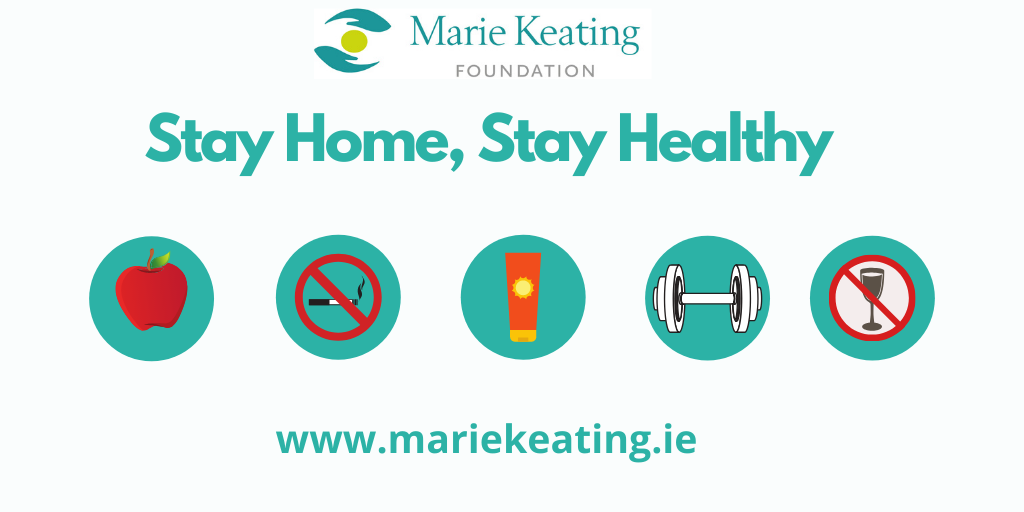
While many of us are self-isolating or cocooning in line with current COVID-19 restrictions, it’s important to stay on top of our health.
Our research shows that, overall, since the beginning of the COVID-19 pandemic in March 2020, adults are eating more unhealthy snack, drinking and smoking more, and gaining weight. These unhealthy habits can have a detrimental effect on our health in the future and increase our risk of cancer.
Studies show that between 30-50% of cancer can be prevented by living a healthy lifestyle. This means taking regular exercise, eating a healthy diet and keeping a normal weight, limiting alcohol intake, not smoking and using sun protection when outdoors.
While many things right now are uncertain, our Your Health Your Choice programme can still be carried out at home. Here are some tips on how you can get started.
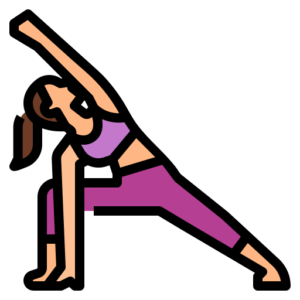 Exercise at home:
Exercise at home:
For those practising social distancing:
As all gyms are closed, it can be easy to let our fitness routines fall by the wayside. However, while working or staying at home, it’s just as important to stay physically healthy as it is to stay mentally healthy, and regular exercise can help with both of these things.
Doing 30 minutes of exercise per day, or two and a half hours per week has been shown to improve mental wellbeing as well as help to reduce a person’s risk of developing cancer.
While still adhering to government restriction guidelines, you can –
- Go for a run, walk or jog to the distance of 2km from your home
- Run or walk in your garden
- Following online work out tutorials
For those cocooning:
For those at extreme medical risk, cocooning had been advised which means you cannot leave your home and must restrict social interactions where at all possible.
While this may limit your options, staying fit and getting your heart rate up while inside is still very possible.
You can:
- Follow an online workout
- Do an online Zumba class
- Skip for 30 minutes
- Do 30 minutes of aerobic house work like cleaning windows of vacuuming.
For those who that cant leave the house, the excellent trainers at Exwell Medical have devised some at home workouts that are simple and easy to follow.
For chair based core exercises, click here
For an aerobic work out routine, click here
And for a strength training at home, click here.
You can also follow the Exwell team on Facebook for more workouts and tips on how to stay healthy at home.
Anything that gets your heart rate elevated is classified as exercise and by doing just 30 minutes of your favourite activity a day, you can help to keep others safe while also reducing your risk of cancer.
For more information about staying active and its benefits, click here.
 Eating Well:
Eating Well:
Eating a good diet and maintaining a healthy weight is an essential step in staying healthy and helping to reduce your risk of developing cancer.
While many of us are self-isolating, we can use this time to start to experiment with fun, healthy dishes that we can enjoy all while giving our bodies the nutrients and energy it needs to stay well.
Cooking healthy meals doesn’t have to be difficult and some recipes can be tasty, healthy and quick to make. Some examples of food you could prepare are:
For more quick and easy healthy meal ideas, click here.
A great resource from those recovering from cancer and looking to find easy recipes to help eat well is the "Cancer-Fighting Kitchen Cookbook" by Rebecca Katz. You can find pages of healthy meals that will help you on your road to recovery all while eating food that's good for your body as well as being tasty. You can get your own copy of the cookbook online here.
To learn more about the importance of good diet and how being overweight can affect your health, click here.
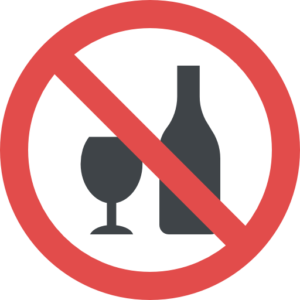 Limiting alcohol intake while at home:
Limiting alcohol intake while at home:
Every year in Ireland, 900 people are diagnosed with an alcohol-related cancer and around 500 people die as a result. The amount of alcohol per person that we drink in Ireland is above the European average meaning we are at an increased risk of developing cancer.
While all pubs are closed, it can be easy to be unaware of the amount we are drinking or over pour on measures while at home. If you are drinking at home, it is important to be aware of how much you are taking in and do not drink to excess. Women should drink no more than 11 standard drinks a week while men should drink no more than 17 standard drinks a week.
Be aware of how many standard drinks are in your favourite drink. For example, there are two standard drinks in a pint.
When it comes to alcohol less is always better so by reducing your alcohol intake and switching to other drinks like water or juice, you can help to reduce your risk of cancer.
For more information on how alcohol impacts our health and a guide to standard measures, click here.
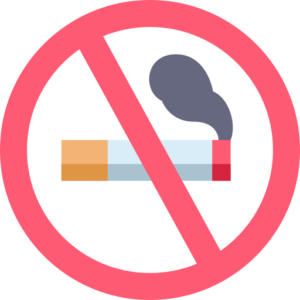 Smoking:
Smoking:
Tobacco is the leading cause of preventable illness across the globe and is a major contributor to many of Ireland’s most common cancers, including lung cancer. According to the Healthy Ireland 2019 Survey, 17% of Ireland’s population are smokers.
While working or spending a lot of time at home, we may not be aware of the number of smoke breaks we are taking which may lead to smoking more than we regularly would. While it is recommended that you do not smoke, and if you are currently a smoker, to quit, while spending extended periods of time at home, tracking the amount that you are smoking and holding yourself to the same smoke break schedule you would in work can help to limit the amount you are smoking on a daily basis.
Staying home could be the push you need, and give you the time and space to quit smoking. 10 tips on how to help you get started are:
- Prepare to quit
Write down your reasons for quitting and keep them close at hand.
- Make a date
Make a date to quit – And stick to it.
- Get support
Ask your family and friends for support.
- Change your routine
Change your routine and plan ahead – replace or change activities that you associate with smoking.
- Be active
Regular activity is good for your health and helps you to manage stress. It also helps to prevent cancer.
- Think positive
You may have withdrawal symptoms. These are positive signs that your body is recovering from the harmful effects of smoking. They will disappear.
- Learn to deal with cravings
Try distracting yourself, have some water or take some deep breaths.
- Save money
Set aside money that you would otherwise spend on tobacco for a reward.
- Watch what you eat
If you are worried about putting on weight, be careful about what you eat.
- Take one day at a time
Remember, every day without smoking is good news for:
- Your health
- Your family
- Your pocket
If you slip-up, all is not lost. Set a new date and start again.
For information on how smoking affects your chances of developing cancer click here.
For resource on how to quit from today, visit the HSE's QUIT page or call their free helpline at 1800 201 203
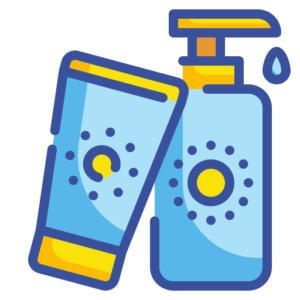 Being SunSmart when outdoors:
Being SunSmart when outdoors:
As many of us are spending more and more time indoors, you may look forward to your morning walk or time spent out in the garden. Spending time outdoors is essential to good physical and mental health but during these uncertain times, it’s important that we look after our skin when outside and help to reduce your risk of cancer.
Skin cancer is the most commonly diagnosed cancer in Ireland with over 11,000 people diagnosed each year. However, you can enjoy time in the fresh air safely if you think ahead and take the simple steps to help protect your skin.
By:
- Wearing sunscreen with a good UV rating and 30+ factor
- Covering up when outside
- Avoiding the sun between 11am – 3pm
- Never using sunbeds
You can help to protect your skin.
For more information on how the sun affects our skin and the importance of being SunSmart, click here.

To read more information about the Your Health Your Choice programme and why good health is imperative to the reduced risk of cancer, click here.
For more information and support for cancer patients and those volunteering with people actively receiving treatment, visit www.mariekeating.ie/covid19.

